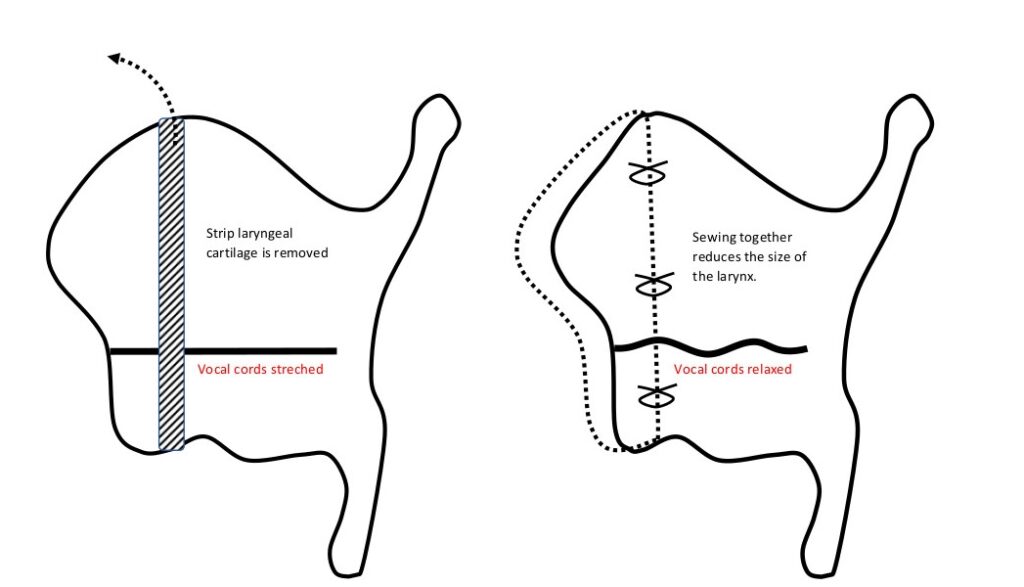Voice Deepening
How to get a deeper voice permanently?
Voice deepening (voice masculinization) is a life-changing surgical procedure that can help men and women who desire a deeper or more masculine voice. The way you sound is inextricably linked to your personal image.
Voice deepening – who needs that?
In principle, the surgery can be performed on all people who feel that their voice pitch is too high or who have an unusually high voice for a man. The surgery is primarily performed on cis-men and trans-men, as well as non-binary people who want to have a more masculine speaking voice. However, people who identify as male but are perceived as a female can also be treated with this surgical method. For people with a physiologically high voice as well as for people who suffer from a voice that is organically too high, as well as for people who suffer from a voice that is not organically but functionally too high, this surgery can be an important and encouraging step.
Differences in male and female larynx
In people who have a male appearance at birth, hormones such as testosterone cause the larynx (including the vocal folds) to enlarge during puberty. During this time, the vocal folds become thicker and longer. These changes lead to a deepening of the voice. The influence of hormones also leads to the formation of a prominent protrusion at the front of the throat, called the Adam’s apple.
The difference in pitch between men and women is determined by the vocal folds, which are longer and thicker in men than in women. Just like an instrument, deeper tones come from instruments with thicker and longer strings. During puberty, the sound of the voice does change, but not always the way you want it to. For this reason, there are adults who are dissatisfied with their voice because their pitch is unusually high or too low.

-
CIS men who have an unusually high voice for a man
-
Transgender men who have received testosterone therapy for more than a year and still sound like a woman
-
Individuals who identify as male but are perceived as female
-
CIS men with a high voice caused by conditions such as mutational falsetto (or puberty) or organic factors (short, stretched, thin, atrophic vocal cords) for whom voice therapy did not produce results.

What kind of surgery is the deepening of the voice?
Voice-deepening surgery, also called type 3 thyroplasty, can permanently change the pitch of your voice.
Voice deepening surgery is performed on an outpatient basis under general anaesthesia, but can also be performed under local anaesthesia so that the patient’s voice can be heard during surgery. In both cases, the patient can be discharged the same day.
It is a shortening of the laryngeal cartilage. More specifically, a section of thyroid cartilage is removed on one or two sides so that the length is shortened from front to back. The shortening of the thyroid cartilage leads to a slackening of the inner vocal folds, which secondarily leads to a deeper voice.
Before voice deepening surgery
The patient will first be seen for an initial consultation. Expectations of the surgery and the potential benefits of postoperative voice therapy will be discussed in detail.
Your surgeon will talk to you in detail about the reasons for the surgery, alternative treatments, and the risks of the procedure, and you will have ample time to ask any questions you may have. In addition, an evaluation and examination of your larynx is essential.
Prior to surgery, you may be asked to discontinue or change medications that inhibit blood clotting in consultation with your primary care physician.
Graphical scheme of the surgical technique voice deepening

Removal of a small strip of cartilage tissue reduces the laryngeal circumference and relaxes the vocal folds, secondarily resulting in a deeper voice.
Thyroplasty type 3 (for voice deepening)
There are several surgical techniques to lower the pitch of the voice. At the MEDICAL VOICE CENTER, we use a modified version of type 3 thyroplasty. In type 3 thyroplasty (and all its variants and variations known worldwide), the thyroid cartilage is reduced in size. Other laryngeal structures, which are also of functional importance, are not touched. The Adam’s apple is not reduced in size, but due to the shortening of the thyroid cartilage, the prominence of the Adam’s apple may be less than preoperatively.
It is important to note that voice deepening surgery has nothing to do with Adam’s apple reduction (tracheal shave).
How is the surgery to deepen the voice performed?
Voice deepening surgery is usually performed under general anesthesia (or local anesthesia with sedation) and takes about 1-2 hours.
-
Your surgeon will make a horizontal incision on the front of your neck, usually in an existing skin fold. This is to ensure that the scar is as little visible as possible.
-
The inside of the larynx is viewed through a tube inserted into the mouth („direct laryngoscopy“) to identify the vocal folds.
-
One wing or both wings of the external thyroid cartilage are freed from muscle and tissue. After cutting out a vertical strip on one or both sides of the thyroid cartilage, the cartilage edges are surgically re-stabilized – usually with permanent sutures.
-
Finally, the surgical area (muscles, tissues, skin) is closed with sutures, if necessary, a temporary drain is placed for 1-3 days.
Is voice deepening surgery painful?
No. Voice deepening surgery is virtually painless and is usually very well tolerated by patients. No postoperative pain is expected after the procedure, and most patients do not need to take pain medication afterward.
Side effects immediately after surgery
Typical postoperative side effects include: Hoarse voice, unusual vocal sounds or breathing noises, coughing, throat clearing, mild sore throat, skin swelling and bruising, difficulty breathing and swallowing. Depending on your symptoms, you may be able to cool the area and take over-the-counter pain medication if needed. Please make sure the wound does not get wet for 1 week.
Behavior immediately after surgery
After surgery, you will be taken to a recovery room for post-operative observation before being discharged by the anesthesiologists. As with any anesthesia, you will need a companion to pick you up after surgery. Only after a subsequent postoperative examination, including a laryngoscopy, and general clearance by one of our physicians at the Medical Voice Center can you finally go home or to your hotel with your companion. Further checks will take place over the following 2 days at the Medical Voice Center. It is recommended that you take it easy for a day or two and do not overexert yourself. During the first days and weeks, you should avoid straining the skin suture on your neck by overstretching it.
You may experience mild discomfort for a few days after the surgery. You should eat soft food until you can swallow without problems. As for the skin, follow your surgeon’s instructions for dressing change and skin suture removal after about 8-10 days.
What long-term risks / side effects should be considered / could occur?
It is advantageous to choose a surgeon with experience in vocal cord surgery so that the risk of voice deterioration is avoided as much as possible. With experience and the appropriate techniques, this risk can be reduced. It is also important not to have unrealistic expectations about the outcome of the surgery. In some cases, very short vocal folds cannot be loosened further because there is always a risk that the voice will then become unresponsive. An experienced surgeon can describe the expected results to avoid disappointment later.
As with any surgical procedure, there are certain risks associated with anesthesia. When you meet with the anesthesiologists before surgery, they will discuss the risks of anesthesia with you and tell you how your behavior can minimize the risks.
Other possible effects and possible complications:
Voice: Roughness of the voice is not a complication, but is inevitably related to slackening of the vocal folds. Surprisingly, this is exactly the expected and desired new voice that some patients desire. However, it is important to mention this fact because this discrepancy has to do with individual and cultural aspects of the voice perceived as masculine and physiologically healthy voice quality. Other complications and disadvantages may include temporary loss of upper vocal range and even complete or permanent loss of head voice function (so-called falsetto voice), as well as limitation of volume. Strained breathing may also cause an audible harsh breathing sound during breathing with high airflow during forced inhalation and exhalation.
Skin: Suture dehiscence („suture rupture“) along the incision line, unfavorable healing with a permanently clearly visible scar, accumulation of fluid under the skin (seroma), accumulation of clotted blood in the tissue (hematoma), permanent injury to the skin nerves with sensory disturbances, co-movement of the neck skin during swallowing, increased instability of the larynx with risk of rupture (not only in case of external impact). Sometimes additional surgery is necessary to correct problems or improve the final result. If severe scar shrinkage occurs later as a complication, skin grafting or flap surgery may be required. Dissatisfaction with the appearance after surgery may also be a consequence.
If any of these symptoms occur or you are otherwise unsure, please contact us or another physician, as well as if you experience fever, severe pain at the surgical site, postoperative bleeding, chest pain, shortness of breath, a irregular heartbeat.
When can I resume my normal daily activities after voice deepening?
No voice rest is required and patients can use their new voice shortly after surgery. But it takes several months for the voice to adjust. Non-strenuous activities can be resumed after only a few days. Sports activities can be resumed after two weeks. You should wait a month before lifting weights.
Prospects of success
The aim of the surgery is mainly to lower the speaking voice (pitch) and sometimes to avoid or prevent a high-pitched voice, although this may occasionally occur involuntarily. Thyroplasty type 3 is the most common surgical method for permanent deepening of the voice. Experience has shown that the desired effect is likely to occur several days to weeks after surgery. In the days following surgery, there is a mild, temporary tissue reaction with local swelling, so that the voice heard immediately after surgery does not yet correspond to the final voice. The voice will change over the following weeks as the vocal fold swelling subsides. Further check-ups are therefore necessary. Depending on the circumstances of the surgery, the final assessment may not be made until several months after surgery. Success also depends on the extent of the existing changes and on endogenous, individual factors such as scarring, voice technique or voice use.
The new voice must also be practiced and adapted to the body’s entire vocal system. Due to the slackening of the vocal folds, there is a significant likelihood of a permanently rougher voice. Some patients want to achieve this very vocal feature because they are convinced that this is associated with the perception of a more masculine voice. Very likely, the ability to speak very loudly is also limited. Voice quality continues to improve, and voice pitch becomes more masculine and deeper over a period of 8-12 months. The result of the surgery is irreversible, as the shortening of the cartilage cannot be reversed.
In the very best hands
The MEDICAL VOICE CENTRUM is a center of excellence where voice enhancing procedures are successfully performed on patients from all over the world. Prof. Markus Hess is a specialist in otolaryngology and phoniatrics. He received his training at Harvard, USA, among others.
Prof. Hess has been performing operations on the larynx and vocal cords for 25 years.
For more information or to schedule an appointment to determine if voice enhancement surgery is right for you, contact us today. We are here for you!
Please ask us if there is anything you do not understand or if you would like to know more about certain aspects outside the operation. We will be happy to provide you with more information. Please ask us about anything that seems important to you.


